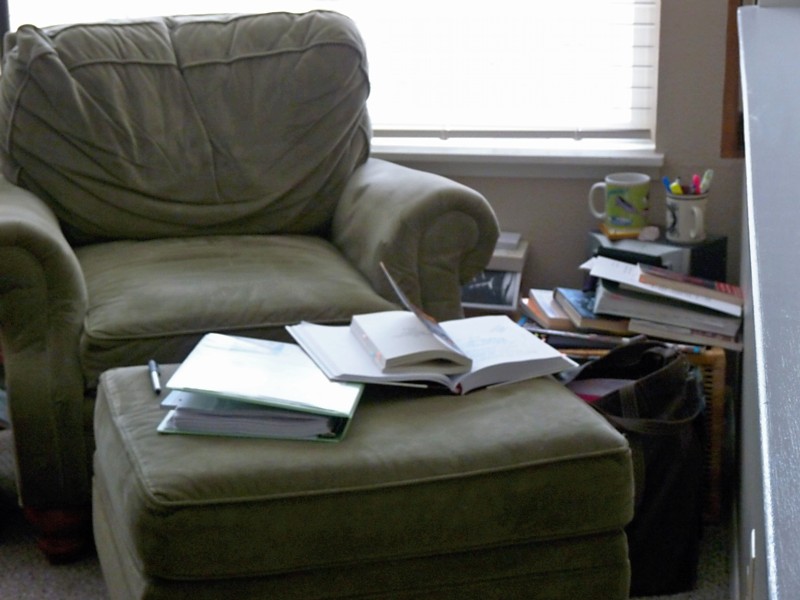Time
 Why is it that — even without the teaching career — even without the three little girls who were underfoot for so many years and now are nearly grown — I STILL feel overwhelmed and as though I don’t have enough time to write?
Why is it that — even without the teaching career — even without the three little girls who were underfoot for so many years and now are nearly grown — I STILL feel overwhelmed and as though I don’t have enough time to write?
Because Louise DeSalvo told me to, I have been reading The 12 Week Year: Get More Done in 12 Weeks than Others Do in 12 Months. In this book, which is largely for manager-types and salespeople, Brian P. Moran and Michael Lennington explain that time is finite:
“It’s important to realize the simple truth that you can’t do it all; otherwise you will continue to labor under the false belief that you will eventually catch up, and finally get to the important stuff. You will continue to use all of your time on the urgent day-to-day activity and postpone the strategic that is required to create breakthrough and, ultimately, the life you desire.” (138)
You wouldn’t think that this would be such a big idea. I’ve encountered it before, and in contexts more relevant to my writing life. But it caught me at a vulnerable moment. And then these sentences, a few paragraphs down the page:
“Reaching a breakthrough isn’t about being incremental. Breakthrough requires a profound change in the way that you work…”
You have no doubt heard before much of what Moran and Lennington say. But their idea of ditching annual goals for 12-week goals strikes me as brilliant. You can still have annual goals, but you have to go through the process of breaking them down into doable 12-week chunks. Instead of writing down for 2015, “Lose 20 pounds, Declutter house; Finish two new books” — which sounds an awful lot like a wish list, rather than goals — thinking in 12-week chunks of time has made me get more concrete in all of my thinking.
If I want to lose 20 pounds this year (ultimate goal: to be radically healthy into my 90s!), how much will I have to lose over the next 12 weeks? And what actions will I have to take this week in order to be on track with my 12-week goals?
To finish my novel rewrite before I take my Florida vacation (which was about 7 weeks out when I  started reading The 12 Week Year), what actions will I need to take? This week? Today?
started reading The 12 Week Year), what actions will I need to take? This week? Today?
To send the requested 8-10 poems to the journal that requested them by the end of May, what actions do I absolutely have to take this morning, now?
I started by printing up a 12-week calendar that fits on a single, 8×10 page — a planning practice from my teaching days. I had SO much to write into it, that I then made the calendar days bigger and put it on two pages of six weeks each. I divided up the work, leaving myself leeway (I know myself too well to think I won’t need leeway), and planning for Sundays off from writing.
Today, one poem, polished and put in the file to submit. (Tomorrow, another.)
I’ll let you know what happens.











This structure sounds SO useful! May help me get off the dime on a new writing project. Thanks for explaining it here, and may it serve you well!
Thanks, Bethany! Do this! Do this! Lead the way. I will do a less ambitious 12 weeks. Let me think…..Love Abby
Can we have the calendar templates? : )
I recently encountered another book that challenges the idea of incremental change: Marie Kondo’s The Life-Changing Magic of Tidying-Up. She claims that decluttering in little bits keeps us from transformative change in our relationships to stuff (which means we’ll keep accumulating the wrong stuff for the wrong reasons, perpetuating the need for constant decluttering). Now, it seems you’re reading the same message in terms of time and the activities we use to fill it. I like the idea of reaching for breakthrough and profound change.
I read that book at Christmas — have to admit that I haven’t implemented its ideas, but it does sound revolutionary!
I CAN send you the templates!
I’ve ordered the same book! It does makes sense. But you have to have a lot of time and energy to implement the de-cluttering…. So interesting she starts with clothes, then books, then papers and only finally gets the things that lie around cluttering things and that we think we can’t part with (miscellaneous collectibles) : ) We always want to start with the clutter on top but she starts with the clutter that’s hidden away, way down deep. : )
It’s almost as though we have to make a choice to neglect something different. Used to neglect the tastiest, most important projects until after the tedious uninteresting stuff was done… This calls for re-prioritizing the tasty stuff. Hm. Feel like I have to be gutsy and rebellious, put my foot down, choose some boring things and say No to them. And listen to my mind telling me how selfish it is. OK, will give it a try.
That’s brilliant! What an insight!
So who cares if there’s still clutter, if we don’t pay all of our attention to it and let it bind us.
To my surprise, I also really like Marie Kondo’s encouragement to be grateful to and appreciative of each of the objects around us in our lives, and to thank even the things we de-clutter for their contributions. That’s part of the difference,maybe, that we appreciate and connect with other beings in friendship, rather than resenting and distancing them as binding us down. If you lovingly fold clothes instead of throwing them in the drawer, you are simultaneously treating yourself more lovingly by extension — that’s what it feels like anyway, to me. We are so neglectful of what we are and therefore of what we have? (That “you are selfish” voice again.)
“This calls for re-prioritizing the tasty stuff. Hm. Feel like I have to be gutsy and rebellious, put my foot down, choose some boring things and say No to them.” Marie Kondo’s idea that has most stuck with me — that we could choose to live only with those things that bring us joy! How often (as Madelon and Janet are saying) do we not treat ourselves to that? Interesting to think of this idea in terms not just of possessions, but of our time and tasks.